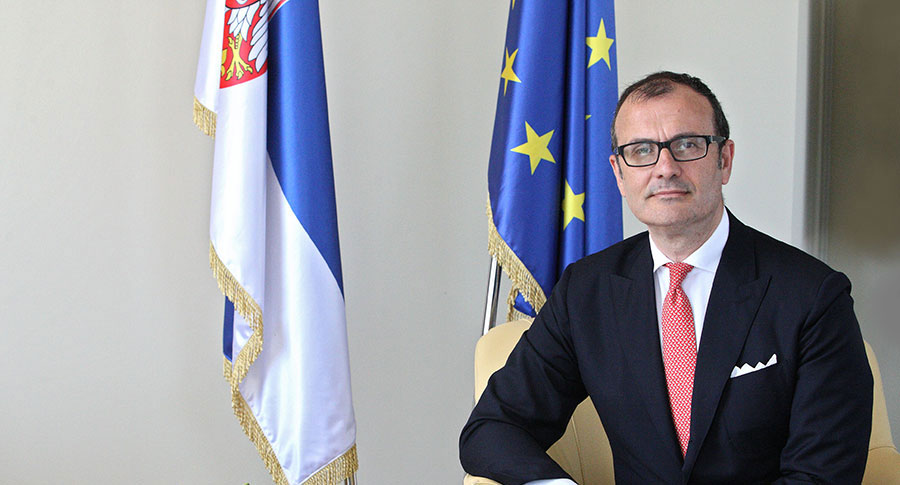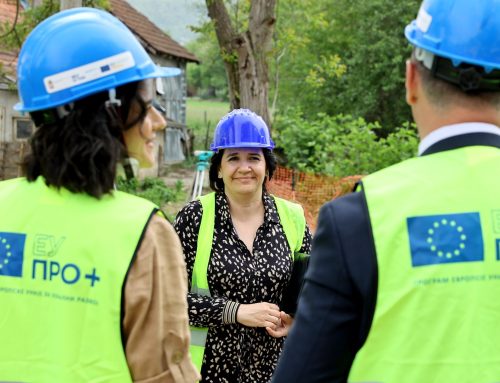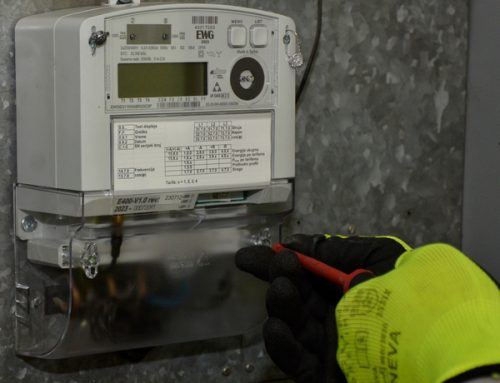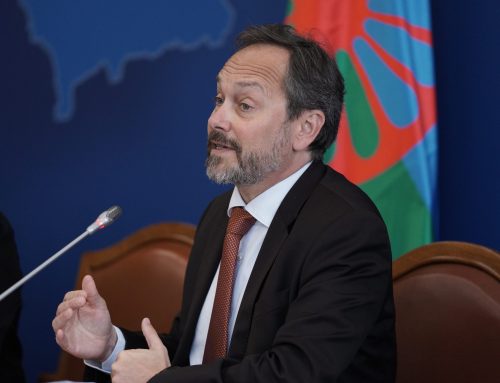In an interview with Blic daily, Head of the EU Delegation to Serbia Sem Fabrizi said that the best Serbian “chair” was the one at the table in Brussels, among other European leaders. He also talked about the verdict in the case of Ratko Mladić, Kosovo, Russia, the rule of law and freedom of media.
Read the full interview below:
Fabrizi assumed the office from Michael Davenport at the end of June and, as he said for our newspaper, he is very much encouraged by the dynamics of relations between Serbia and EU.
Commitment of the Serbian leadership to the EU accession is clear. I believe we are heading in the right direction, and I also see determination in Brussels to look at Serbia as a future member state. President Juncker made an important speech last September and there will be a new EU Strategy for WB region coming up in February 2018. In this short period of time since my arrival I have seen encouraging and positive messages and feelings on both sides, and my job is to make sure such positive dynamic continues.
You said recently that Serbia had to “work harder” on aligning its foreign policy with that of the EU. Does this mean that we are not working hard enough?
As a candidate country Serbia has an obligation to align its foreign policy with the EU common foreign and security policy. This is an obligation that is expected to be met in full at the time of accession. My message is that Serbia has already made some good steps, for instance, Serbian troops are part of EU led missions in Africa. Serbia has also decided to join EU Battlegroup HELBROC, which is led by Greece. So, Serbia is working on it, but clearly this process will have to be completed at the end of the day i.e. Serbia will have to fully align its foreign policy with EU.
How does this affect Serbian relations with Russia?
The message is clear. EU member states and the countries wishing to become members have to proceed within the framework of the common foreign and security policy. You can develop relations with non- EU member states, Russia or any other country in the world, if you respect this common framework. This is as simple as that, since Serbia is in the EU accession process, policy alignment is the ultimate objective, and relations with other countries can be fostered if the set framework is abided by.
Brian Hoyt Yee caused commotion recently in the Serbian public with his statement on sitting on two chairs. The Serbian Defence Minister took it as a threat and the President as a pressure. How do you see it?
I prefer not to comment on comments, but let me say – using a geo-startegic formula – that we are not in a “zero-sum-game”. Let me clarify: when you decide to join the EU, you join EU values and interests; you don’t join EU against someone else. You join EU so as to be part of a Union that promotes EU values and interests – security, prosperity and democracy – in a rules-based international order.
This is how I see Serbia’s future, and if you insist on explaining it with “chairs”, I see Serbia sitting at the EU table with other European leaders and working together every day on promoting the EU values and interests.
Speaking of Russia, how do you see the Humanitarian Centre in Niš that wants a diplomatic immunity?
We see it from a different perspective. You know that Serbia is a part of the EU Civil Protection Mechanism, which is very important when it comes to joint actions in fighting natural and man-made disasters. Serbia was hit by tremendous floods in 2014; this is when the EU activated its mechanism and it proved to be very useful to help Serbian citizens. So, when you ask me about the humanitarian centre in Niš what is important is that the centre is compatible with Serbia-EU relations i.e. with the Civil Protection Mechanism. Serbian authorities clearly said several times that the centre would not have a military role nor a vehicle for regional coordination, and we fully took note of it.
Serbia pursues military neutrality. Does this mean that we can have military cooperation with both NATO and Russia?
Regarding relations with Russia, as for all other third countries, the EU foreign policy allows the member states to develop their relations, while respecting the common framework. Likewise, Serbia will have to adjust to it 100% at the time of accession. Serbian authorities keep repeating their commitment to the European path and we expect to see continuity in its actions. As for NATO, the President of Serbia paid an important visit to NATO headquarters last week, and we see the relations are being developed positively.
Rumour coming from Brussels has it that EU will form its own army?
EU started with coal and steel in 1950s. Then continued with the common agricultural policy, the single market, Schengen, the single currency (euro), and the common foreign and security policy. Europe has always worked by joining sovereignty of its member states for the sake of a common European good. Inevitably, we have to pay attention to changes in the scenario and new threats. It is natural for the EU to look at defence and security as areas that we need to work on. This is not something new. This idea was born in the past. But time has brought various developments – including migrations, terrorism, cyber-attacks, and numerous serious threats have made the EU start dealing again with defence elements. The HVRP released a global strategy in 2016 calling for closer cooperation. Only one year later significant steps have been taken to improve security and defence, including closer cooperation with NATO A common defence fund will be also launched to foster stronger cooperation. This is not an army, but rather joining of our member states’ abilities and capacities . Once in the EU Serbia will also be part of this .
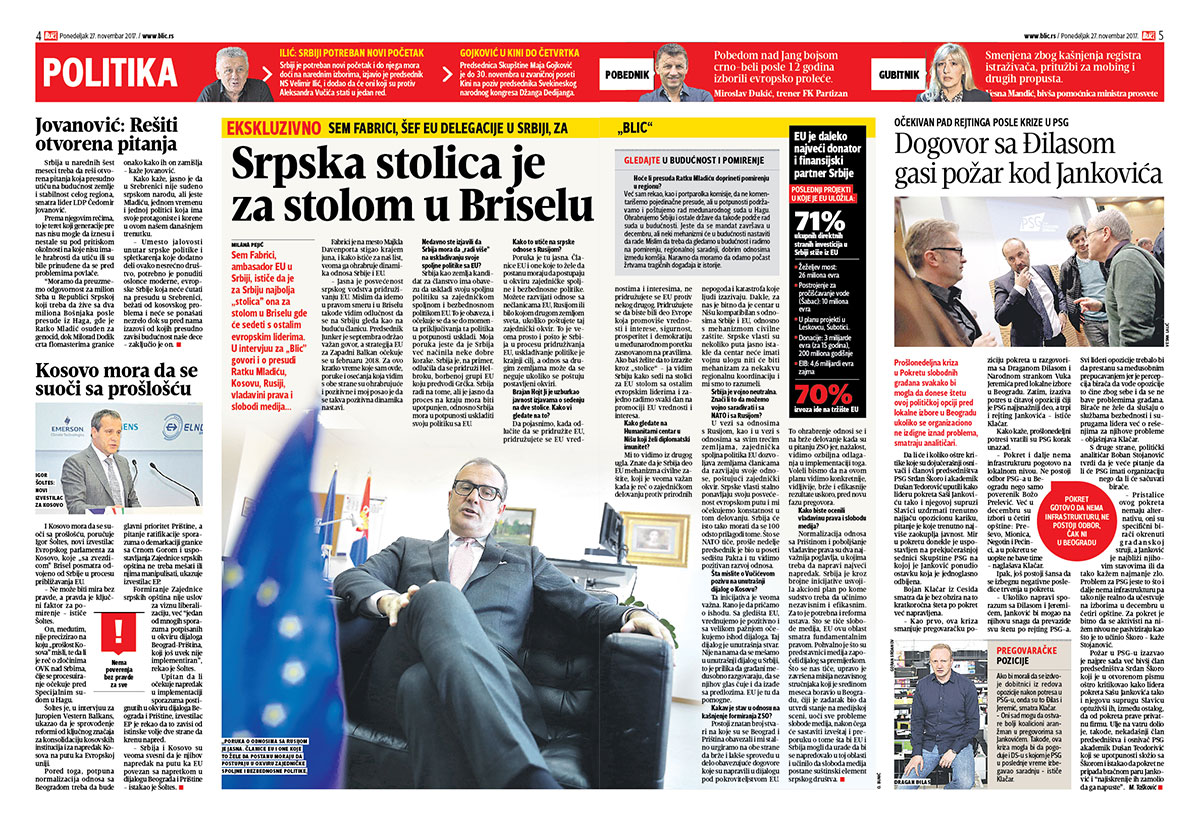 Normalisation of relations between Belgrade and Priština is one of the main EU conditions. What do you think about Vučić’s call for an internal dialogue?
Normalisation of relations between Belgrade and Priština is one of the main EU conditions. What do you think about Vučić’s call for an internal dialogue?
This a very important initiative because crucial problems of a country and its future have to be debated among the people. It is too early to talk about the outcome. From the EU’s point of view, it is a positive development and we are following the outcome of this dialogue with great attention. We are not to interfere in the internal dialogue among the Serbs; This dialogue is an internal matter, for the Serbs to have their voices heard and to come up with some proposals. The EU is facilitating discussions between Belgrade and Priština.
When we talk about normalisation of relations, what is your view on the delays in establishing the Community of Serb Municipalities (CSM)?
There is quite a number of issues Belgrade and Priština committed to, and we keep urging both sides to implement the binding commitments made under the EU facilitated Dialogue. This encouragement also refers to actions regarding the CSM issue because, unfortunately, we see serious delays in its implementation. We would like to see more concrete and visible, effective results on this front soon, in conjunction with a new phase of the EU facilitated Dialogue starts.
Was the decision not to head for general elections a good move?
Not for me to comment on the elections. Of course a stable government is always preferable. Numerous reforms are ongoing and I am glad to see that the Government will continue with its work.
How do you see the relations in the region where new tensions arise every now and then?
It is true that the region has difficult moments in its history, when tensions turned into violence, and we have to make sure such times don’t come back. But I am quite positive in my belief that it won’t happen. If you look at the EU, it is based on reconciliation between traditional enemies, and a way was found to overcome the past and look to the future. This is EU’s biggest achievement. Unity in diversity is our motto, i.e. how we can fit member states’ differences together and create unity. I think this is the European perspective of the Western Balkans – to overcome legacy of the past and look towards the future. Emotions need to be handled better and the method of dialogue should be pursued in the region. A model has to be found that would benefit all sides. EU stands ready to help and assist whenever needed.
Will the verdict on Ratko Mladić contribute to reconciliation?
I have already given my statement, so did the EU spokesperson – we don’t comment on individual verdicts, but we fully support and respect the work of the International Tribunal in Hague. We encourage Serbia and other countries to also support the tribunal’s work in the future. It is true that its mandate will end in December, but there will be mechanisms that will continue working in the future. I think that we need to look to the future and work on reconciliation, regional cooperation and good neighbourly relations. Of course, we have to pay respect to the victims of tragic events from the history.
How would you assess the rule of law and freedom of media, for which Serbia is receiving biggest criticism?
Normalisation of relations with Priština and improvement of the rule of law are the two most important chapters in which Serbia has to make the biggest progress. Rule of law is one of the key elements of the very EU. Chapters 23 and 24 contain a large number of reforms that are needed so as to create a more democratic and freer society. Serbia has agreed upon an action plan through numerous initiatives, according to which we have to make the judiciary independent and more efficient. This also calls for the constitutional reform. Just the other day I was with the Serbian Minister of Justice visiting the Palace of Justice, and we talked with her about the necessity for judges, lawyers and citizens to have an adequate place where justice will be met quickly and efficiently. I have to mention that rule of law also includes the area of fight against corruption, cooperation with the International Tribunal in Hague, as well as freedom of media. Hence, this is a very broad chapter of reforms, and the EU report on Serbia’s progress in all areas is expected in April 2018. As regards the freedom of media, this area is for the EU a fundamental right, which has to be ensured and respected. It is commendable that media representatives have started a dialogue with the Prime Minister. As for us, the EU has sent an independent team from Brussels to Serbia, which held meetings all last week long and try to identify a number of issues concerning media freedom. After that they will draft a report and recommendations on what the EU could do so as to help progress to be achieved in this area and make the freedom of media become an essential element of the Serbian society.
You have been here for several months. How do you like Serbia, and what are your first impressions?
From the professional point of view this is a very interesting period for me, very dynamic. Personally, it think that Belgrade is a very lively city, people are very warm and friendly, many of them speak English, even Italian, but one of the goals I have targeted for myself is to learn a bit of Serbian.
Serbia’s biggest partner
Serbia is dedicated to development of a democratic society, better economy, more competitive agriculture, infrastructure, etc. In the past 15 years the EU has donated 3 billion euros to Serbia, or 200 million a year. Regarding the projects in Šabac and Novi Sad, the Žeželj bridge is of particular infrastructural importance because it forms part of a broader transport modernisation, which links Serbia with the European network. It is also a part of Corridor X, which links Salzburg and Thessaloniki, that is, north-est and south -east. This is just one of the projects we are funding, and we have donated 26 million for the construction of bridge and access roads. Šabac got a waste water treatment plant, and thanks to this 10-million-euro investment the citizens of Šabac and its surroundings now have water of better quality. We are financing similar projects in many other towns such as Subotica, Leskovac, etc. which help Serbia not only in obtaining a better quality of living, water and air, but also in reaching EU standards. Speaking of numbers, along with already mentioned EU donations, the European Investment Bank has given Serbia a loan worth 4.6 billion euros specifically for infrastructure and transport projects. If you look at the numbers, how much we have donated and lent, you will find that the EU is by far the biggest donor and financial partner of Serbia. In addition, 71% percent of foreign direct investments in Serbia come from EU companies, which employ nearly 200.000 Serbian citizens and make Serbia an attractive destination for future investors. According to the latest figures, 16.1 billion euros have been invested by European companies over the past 15 years or so. If you sum up all these figures – subsidies, loans and investments – you will see how much the EU and investors are investing in this country.

